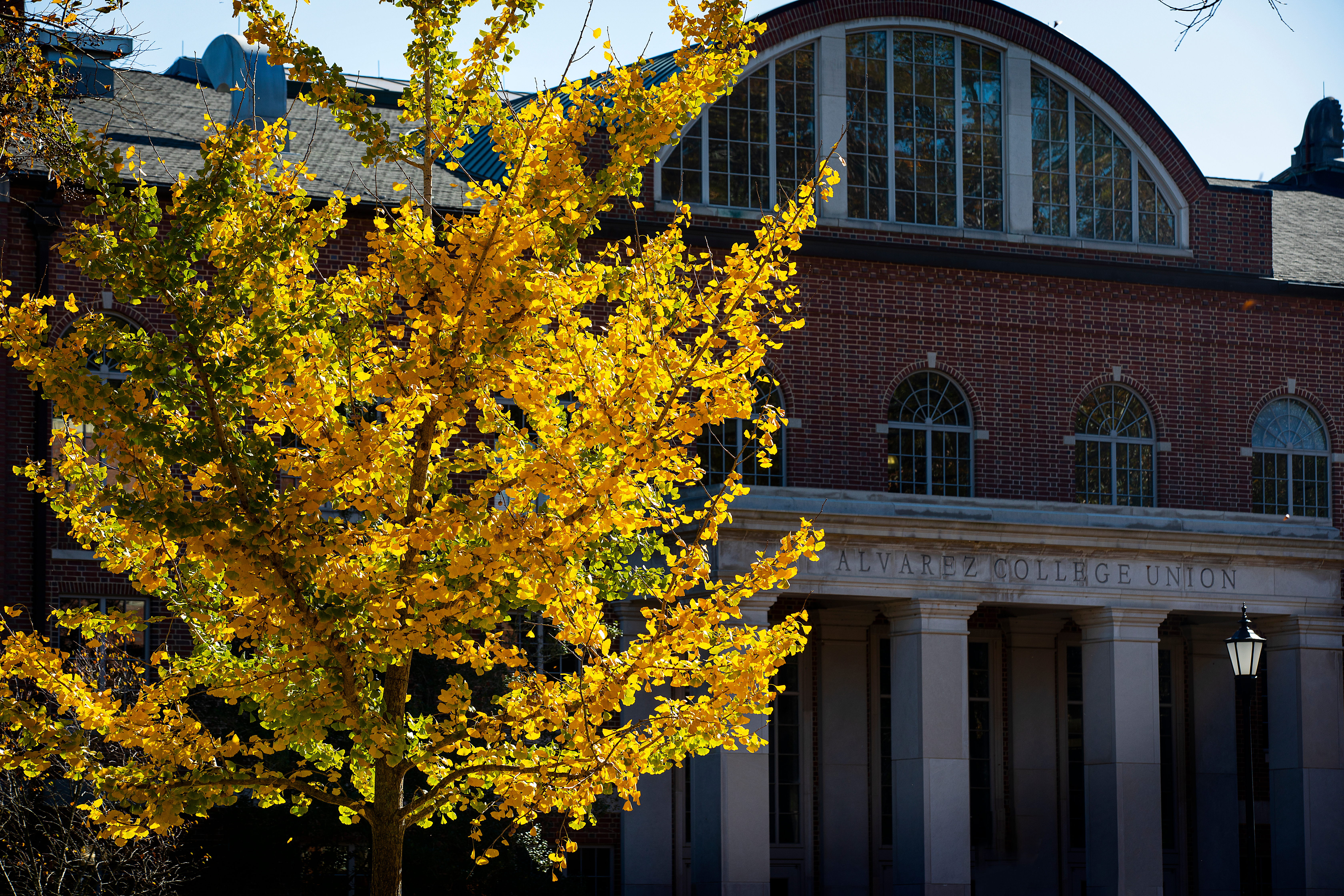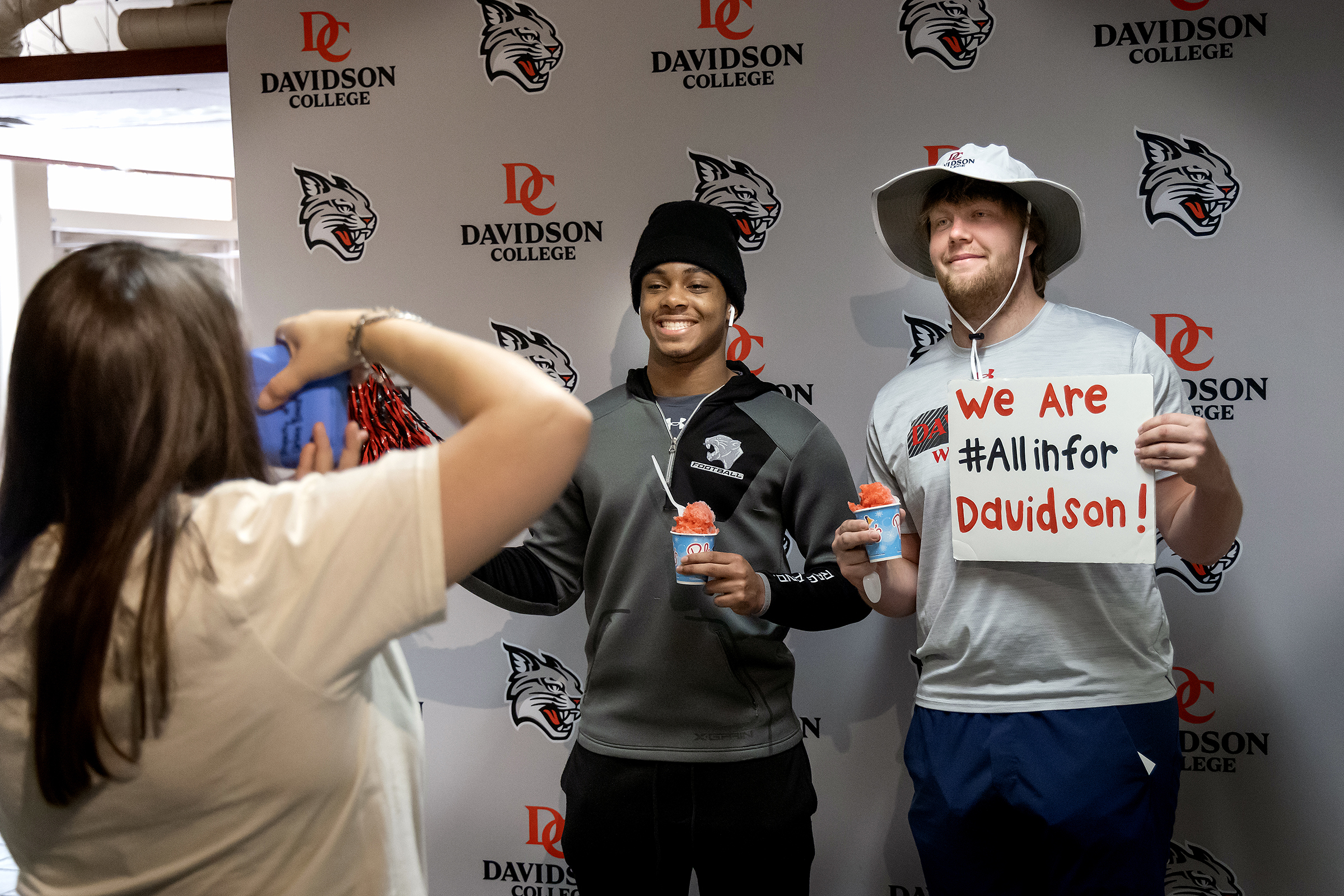"Once in a Lifetime": Barton Retires from Psychology Dept.
Cole Barton remembers 1983 well. It was the year he joined the Davidson faculty. The Talking Heads song "Once in a Lifetime" was getting lots of play.
"And you may find yourself in a beautiful house/with a beautiful wife," Barton intoned from memory, in his Hamilton House office one spring day in 2015. "And you may ask yourself/Well... How did I get here?"
Barton, who is retiring this year as the college's inaugural C. Louise Nelson Professor of Psychology, still marvels at that question, one that ran through his head for decades on his walk to work. He marvels at the good fortune its answers contained over the years for him and his family in the "beautiful house" of Davidson College.
Part of it, of course, or maybe most of it, is his attitude.
"Described as being cheerful, witty, selfless, down-to-earth, sensitive, honest, determined and an all-around good guy," declares his Hunter-Hamilton Love of Teaching Award citation from 1999, "this professor exhibits a contagious enthusiasm for life, fly-fishing, Texas music, and the practical application of statistics to the understanding of human behavior."
How Did He Get Here?
"I'd read Catcher in the Rye, so I knew there were private schools, but places like Davidson weren't on my radar," said Barton.
He was an Air Force kid who moved around a good bit, always the new kid who said "Yes, sir" and "Yes, ma'am." He wound up in Texas, a youth with an active sense of physical adventure as well as strong intellectual curiosity and capacity.
He credits his military, Irish dad with optimizing his intellectual capital.
"Inadvertently he turned me into a college professor," Barton recalled of the family's Sputnik-era "study table," imbued with his dad's strong Jesuit educational sensibilities.
"Dad would say, ‘I don't know what all this is, but I know that if you understand it, you can explain it to me," Barton said. "So I started studying things as though I was going to have to explain them to someone else."
Barton earned his bachelor's, master's and doctoral degrees at the University of Utah. One of the young developmental psychologists on faculty there was Ruth Ault, soon to come to Davidson.
At the U, Barton and his once-in-a-lifetime beautiful wife, Sydney, had a son Bret, age 4 or 5 at the time, who was a big hit with the developmental psychology clinicians around the office.
"He was a great study subject for their intelligence skills or play observation," Barton recalled. "Then he got really good at it, and he would tell the new grad students, ‘I think you're supposed to give me the puzzles next.'"
Ault, now a Davidson professor emeritus of psychology, was instrumental in getting Barton to Davidson.
The weather helped, too.
"One day, I was looking out at one-and-a-half feet of old gray snow in Little Cottonwood Canyon in Utah. I flipped on the TV and saw the Masters Tournament, with green grass and blooming azaleas," he recalled.
When he visited Davidson, it was the people he met that cinched the deal.
"The friendliness of the faculty and students just blew me away," Barton said.
Teaching, and Research... and Teaching Research
"An insightful clinician and keen statistician," according to the retirement citation read at his last faculty meeting, Barton contributed mightily from the start to a department expanding to cover an array of sub-specialties: adolescent psychology, peer socialization, emerging sexuality, peer support and affiliation, social identity, eating disorders, juvenile delinquency, substance abuse.
He learned quickly to balance teaching, research and clinical practice. Teaching always came first, in and out of the classroom.
It was a lesson he learned his third week on the job from the late Professor of Psychology John Kelton: Barton was having a hallway conversation between classes with Kelton, when a student slowed down, then hovered, then stood by patiently waiting to speak with Kelton.
"John stopped talking to me and oriented himself to the student," Barton recalled. "I quickly learned how important teaching was here."
The rest he picked up over time. Take faculty meetings. Please.
"The cultural anthropology of our faculty meetings is a very powerful socialization factor in the life of a professor at Davidson College," he deadpans with analytical dispassion.
Right out of the gate at Davidson, Barton served as director of the Davidson-Broughton Summer Internship Program at North Carolina's regional mental health facility in nearby Morganton.
"I began to see that if I couldn't get research done at a place like Davidson, then I've got no business doing it anyway!" he said.
In 1988, Barton received a MacArthur Foundation Fellowship for a research symposium on behavioral medicine and health psychology. Soon came a National Institutes for Mental Health Fellowship for clinical work on stress, vulnerability and resilience in families. He worked with a graduate school mentor in a sabbatical grant position at the University of California at San Francisco, and also with the San Francisco Fire Department in the wake of the 1989 earthquake there. He consulted with the National Center for Missing and Exploited Children in Washington, D.C.
When he returned to Davidson, he brought his clinical data back with him, making it available to his students for case studies in their research projects.
Barton's course work and research covered an ever-expanding gamut: abnormal behavior, clinical psychology, experimental psychology, family interaction and psychopathology, theories of personality, adolescent development, statistics, research design, methods in clinical psychology, psychology and medicine, clinical neuroscience, interviewing, and a full range of assessment research and practice.
A sampler of his research paper titles, many published with Davidson colleagues, illuminates the depth and breadth of his approaches to different aspects of his field: "Researchers and family therapists: Shall the twain ever meet?", "Best practices for teaching statistics and research methods in the behavioral sciences," "Focal Expression of Mutated Tau in Entorhinal Cortex Neurons of Rats Impairs Spatial Working Memory"
"I've always felt freedom to take off in new directions and study new problems in new ways," he said. "At Davidson you're working with people who expect the best from you."
That Beautiful House
Barton gets a special kick out of the Psychology Department's Hamilton House. When he and his wife Sydney first moved to Davidson, it was the only place they could find to live, and it wasn't such a beautiful house then: clanky radiators, no air conditioning, cockroaches the size of mice and a well-fed black snake in the basement.
They soon bought their own house in which to raise young Bret and his siblings, Luke and Amanda. The college reimagined Hamilton House as psychology office and lab space. Today, the office where he sits is his and Sydney's onetime bedroom.
Barton smiles and looks out the window onto the sidewalk of Concord Road.
He remembers his first days here as a young married man and newly hired professor, when the denizens of Hamilton House and of Jackson Court, also residential then, joined forces socially to form the "Concord Road Lawn Tennis Association."
Barton became known for knowing everyone on campus, and even now tells his story in terms of friends and colleagues. He reels off names of contemporaries and mentors, Plank, Cole, Nelson, Manning.... He pauses to remember especially his dear friend, math faculty colleague and fly-fishing buddy, the late Robert Whitton, who used to walk past this window to and from home and Chambers.
Barton harks to the classroom, recalling the fine work just last year of Savannah Erwin '14, a psychology major and Broughton summer intern, whose mother and aunt he also directed in their own internships at Broughton a generation ago. Erwin worked a postgraduate year in Davidson Professor of Psychology Kristi Multhaup's cognitive aging lab and is moving to Massachusetts General Hospital to work in the Psychology Assessment Center as a clinical research coordinator.
He remembers his work with NorthEast Medical Center's clinical research program in Concord, the training consultancy work in Fayetteville, his own private clinical practice since 1985.
"Practice supports academic life," he said.
As one of his final big projects, Barton and his former student Lauren Stutts '05, now a visiting assistant professor, served as founding designers for the four-year, longitudinal Duke Endowment study of psychological resiliency in college students, currently underway at Davidson in collaboration with the three other Duke Endowment beneficiary schools: Johnson C. Smith University, Furman University and Duke University.
It is appropriate that the study focuses on students as students, not just subjects, as it analyzes the effects in 2015 of college life at a place like Davidson, "where you're working with people who always expect the best."
Through it all, Barton has sought to balance perspective, shift though it might, by asking the right questions.
"In science you're supposed to keep values from seeping into what you're doing," he muses. "But what if what you're doing is values-centered?"



